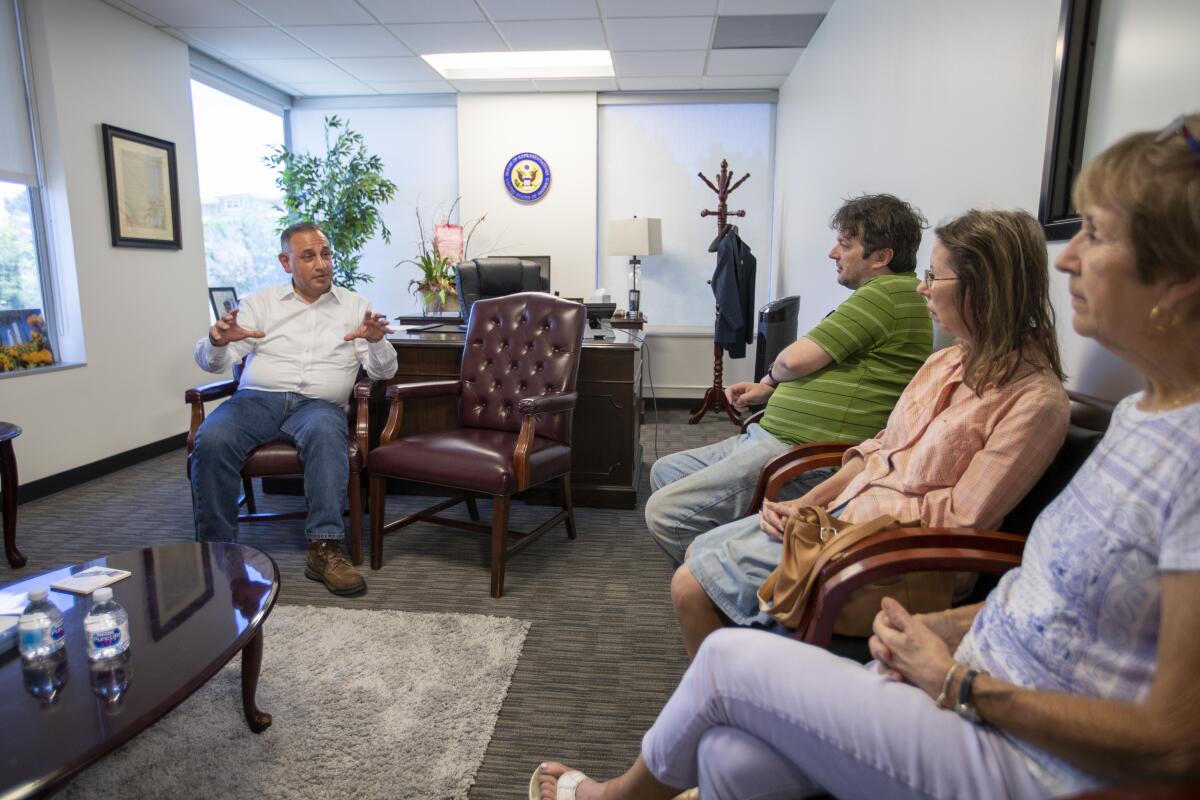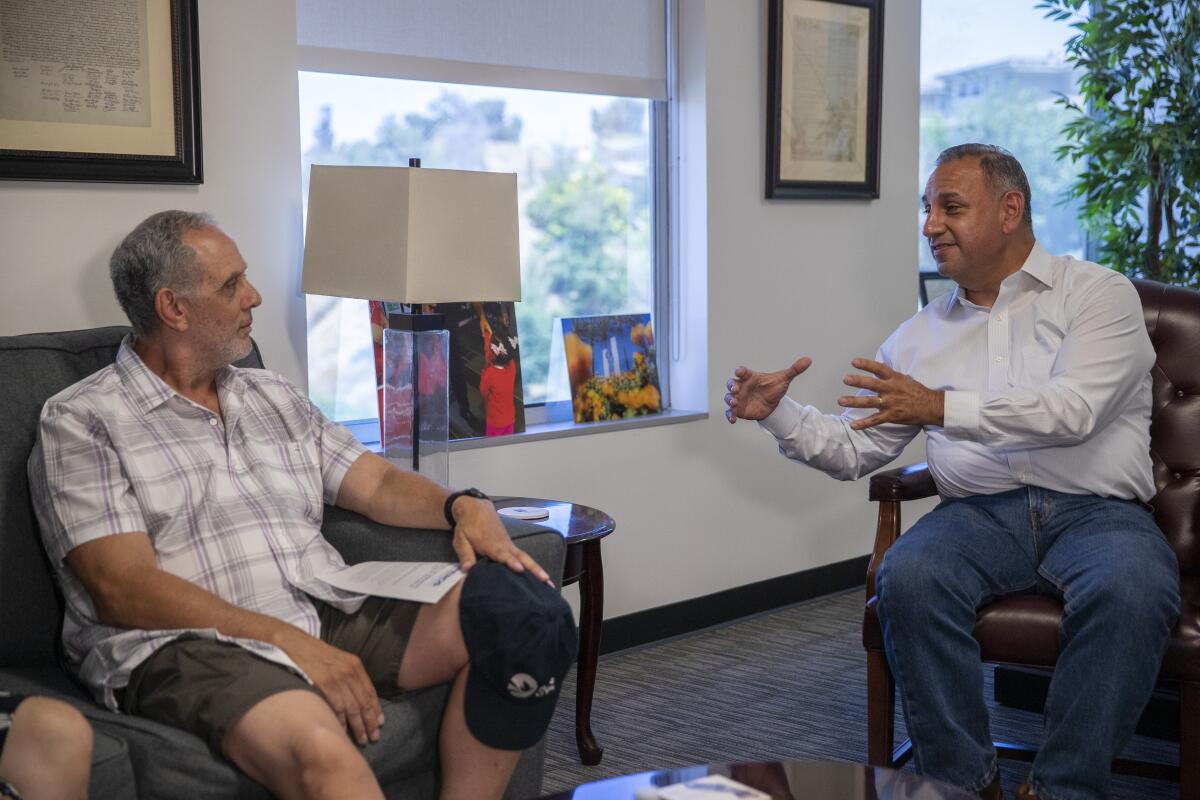The ‘Squad,’ impeachment bring challenges for vulnerable Democrats in Orange County swing districts

Democratic Rep. Gil Cisneros of Yorba Linda, a freshman member of Congress in a historically Republican swing district, spent a recent Sunday telling constituents about what he’s accomplishing in Washington in hopes they will reelect him.
But he and other vulnerable California Democratic Party freshmen are discovering just how hard it can be to compete with the national political narrative revolving around President Trump, his tweets and tensions between Democratic leadership and others in the party who hope to push it further left.
At his Fullerton district headquarters last month, Cisneros answered questions from constituents about homelessness and veterans’ services, and directed staff to assist with immigration cases and disability benefits.
It didn’t take long for talk of Trump to creep in.
Some liberal voters pushed Cisneros to support an impeachment inquiry, which he has thus far declined to do. Others feared the consequences of focusing intently on the president.
“Every day there’s a new distraction, which takes the focus away from us, the work that you’re doing for us, right?” said Rohit Kaushik, a Democrat from Yorba Linda who said he wanted his party to stay on message. “You’re going around answering questions on stupid things that [the president] said, whether it’s racist or not,” he added, referring to Trump’s tweets targeting several of Cisneros’ freshman colleagues.
Don, a La Habra resident who declined to give his last name, fretted over the influence of “the Squad” — freshman Democratic Reps. Alexandria Ocasio-Cortez of New York, Ilhan Omar of Minnesota, Ayanna Pressley of Massachusetts and Rashida Tlaib of Michigan — and whether it could cost Democrats the White House.
“I’ve been a liberal Democrat my entire life, and I’m really, really concerned about how far left they’re pushing the party. We can’t afford to lose this next election,” he told Cisneros.
“Democrats have the House [of Representatives] right now because of moderates,” Cisneros replied. “The other side is really pushing to make you think that there’s four individuals and that’s really who’s controlling the party. It’s not the truth. That’s the furthest thing from the truth.”
A recent Morning Consult/Politico national poll appears to show a little more than half of voters agree with Cisneros on that — 58% of voters polled think House Speaker Nancy Pelosi represents the views of Democrats in Washington, compared with 40% of voters who think the same of Ocasio-Cortez, Omar, Pressley and Tlaib.
In an interview, Cisneros sought to distance himself from the four progressive congresswomen. He bristled at a recent attack from a conservative group comparing his voting record to that of Ocasio-Cortez.
“As if I’m really kind of considering how she’s going to vote,” Cisneros said.
“They’re four intelligent, bright young women, and we don’t agree on everything,” he said of his colleagues. “But to kind of portray it as if somehow they’re the new leaders of the Democratic Party ... and that what they’re doing is somehow changing the direction of the party. It’s not.”
Cisneros called squabbles among the so-called Squad, Trump and Pelosi “distracting” but added that the Democratic caucus needed to do a better job of honing its message.
During his meetings with constituents, Cisneros talked about a bill he introduced to require the printing of information on veterans’ benefits in Spanish and Tagalog; another that would extend a program helping women in the military transition to the veterans’ healthcare system after leaving active duty; and his vote for legislation that would block the sale of arms to Saudi Arabia, which was vetoed by Trump days later.
“We’re talking more about Trump and about comments that he makes than we are talking about the issues and what we’re moving through the House, and that’s a problem,” he said. “We have to let the American people know what we’re working on in the House and what we’re accomplishing, and that’s what’s really going to take us to victory.”
That same weekend, freshman Democratic Rep. Mike Levin of San Juan Capistrano held a monthly town hall 40 miles to the south — his seventh since being sworn in in January — to discuss his signature campaign issue, the environment.
He opened the event by acknowledging that the discourse in Washington “seems to be getting worse” and repeatedly complained about media coverage of inside-the-Beltway controversies. Levin mentioned funding he helped secure for Camp Pendleton and a bipartisan bill he introduced to promote wind and solar energy on public lands.
“While you hear all this noise and garbage on television, on cable news, there’s a lot going on that isn’t reported,” Levin told more than 150 people who had gathered at San Clemente High School. “There’s a lot of good things happening, things where we’re working across the aisle, focused on our local communities and where we’re getting things done for you.”

Later, a constituent asked a question about “all the infighting and name-calling” in Washington.
“How do you think that we could get anything accomplished there?” the woman said.
“The press likes to sell newspapers, they like clicks, they like Facebook ‘likes,’ ” Levin responded. “The Washington that I see on a daily basis when I go there is a far cry from the divisive toxic place that the media portrays” it to be.
Levin, who recently announced his support for an impeachment inquiry, said in an interview he spent much of his time in Washington trying to find areas of common ground with Republicans.
“When I sit down with residents, they don’t necessarily want to talk about what’s going on with the mess in Washington,” he said. “They want to talk about how policies in Washington impact the local community.”
Rep. Katie Porter (D-Irvine) said that, for the most part, the same was true of her constituents. But she doesn’t mind fielding questions about her colleagues in Washington.
“I get asked questions about [Republican Rep.] Chip Roy from Texas and why he was holding up votes on disaster appropriations. I get asked questions about Alexandria [Ocasio-Cortez]’s approach to immigration,” Porter said. “I try to explain to people that, you know, part of this difference of opinion is the vibrancy of our democracy. ... I’m not bothered by these questions. I want my constituents to be thinking about Congress, caring about its work and fully engaged.”
Porter says the high level of interest in what goes on in Washington doesn’t keep her from doing her job.
She recently invited constituents to an event at a local coffee shop, where more than 100 people showed up. They discussed the increasing costs of prescription drugs and the use of pesticides on local playgrounds, but she was also asked about the status of an impeachment inquiry, which she supports, and comments Pelosi made about Ocasio-Cortez and others.
Porter says she works hard to reach out to her constituents by updating them on legislation at town halls, hearing their concerns at community meetings and putting out videos on social media to explain her decision-making.
“I think it’s incumbent on each representative to be reaching out consistently and creatively to get their message out to their constituents,” she said.
For his part, Levin said that in addition to his town halls, he sends frequent email updates and has organized house parties at which he addresses a few dozen constituents at a time.
“I’ve come to the realization that the noise is going to be there, regardless of if I’m frustrated or not frustrated,” Levin said. “I just have to operate within that structure and try to get things done for my constituents here.”
At his town hall, which was organized by his campaign, an exchange with a voter drove home just how hard it could be to avoid talk of Washington.
Throughout the event, the largely friendly audience listened as Levin talked up his work trying to block offshore oil drilling in California, his support for banning a toxic pesticide, and a bill he introduced to increase the number of electric vehicle charging stations in national parks.
On the topic of the shutdown San Onofre nuclear plant, a key concern for many residents in his district, he detailed how the remaining nuclear waste could be transported, where it could be stored and the seismic risk factor involved.
“We need a permanent repository where we can store it for the next 10,000 years,” he started to explain before being interrupted.
“Mar-a-Lago!” yelled a voice in the audience, referencing Trump’s Palm Beach, Fla., resort. The crowd erupted in laughter.
Levin winced through a smile and shook his head.
“For the people watching live on Facebook, I’m not going to repeat that.”

More to Read
Sign up for Essential California
The most important California stories and recommendations in your inbox every morning.
You may occasionally receive promotional content from the Los Angeles Times.










